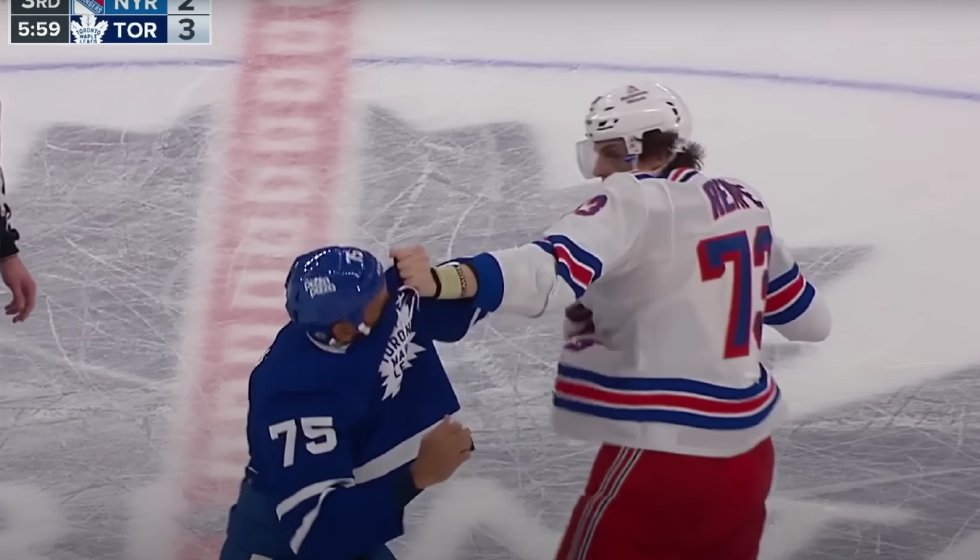
During the third period of the game on Saturday night in Toronto, something that was bound to happen happened. Leafs' toughie Ryan Reaves came face-to-face at the center point with Matt Rempe, the massive rookie from the New York Rangers. Standing tall at 6ft 7in and weighing 240 lbs, Rempe is a center who has scored once and assisted once in his first seven appearances in the NHL.
He's been in the penalty box for 37 minutes, five minutes longer than he's spent playing in the game. He's often called an "enforcer" - a player whose job is to scare or physically confront the other team.
Rempe's struggle in the NHL's evolving landscape
Rempe has spent most of his time fighting in the NHL. Due to severe consequences, this level of aggression hasn't been common in the league for years. Notably, the deaths of "enforcers" like Derek Boogaard, Wade Belak, and Rick Rypien in 2011 sparked major changes. Since then, the arguments against this aggressive role, sometimes called a "goon," have only grown stronger.
Many research efforts have connected fighting in hockey to Chronic Traumatic Encephalopathy, a brain condition. Despite this, the NHL's top person, Gary Bettman, does not agree with these findings. Around the same time, another shift occurred in hockey: the rise of analytics.
Lately, deep data analysis has been applied to all players and future talent, with teams tirelessly looking for measurable data in addition to traditional scouting reports. It is all to win games. Within this new system, enforcers like Rempe find it challenging to fit in.
They usually don't score much and are often not the best or fastest skaters, nor do they regularly initiate successful zone entries.
Hockey's shift from fighting to faster, inclusive play
In recent years, fighting in hockey has decreased considerably. One study found that 645 fights took place in the 2010-11 season compared to a projected 282 fights this season. This drop in fighting has made the game faster and more engaging, which many people view as a positive change. Moreover, the modern game strives to be more inclusive, catering to marginalized groups.
Fighting is a crucial aspect of hockey's "code," functioning as unstated rules of behavior and fair play. On any given Saturday night, TNT's NHL panel scrutinizes plays such as Rempe’s earlier engagement that night with Ilya Lyubushkin, which initiated the conflict with Reaves. According to former NHL tough guy Paul Bissonnette, while some might view Rempe's hit as a bit over the top, it aligns with the old-school mindset.
Bissonnette approved of the hit and the subsequent response from the opposing team's enforcer. Despite his expectation for a penalty, Bissonnette appreciated Rempe stepping up to answer for his actions.
NHL's cultural battle amid inclusion debate
The discussion surrounding Matt Rempe's return to fighting in the NHL continues to be significant, primarily within the hockey community. However, much like its sports counterparts, the National Hockey League remains vulnerable to becoming a cultural battleground. It was evident last year during the All-Star break in Florida when the NHL posted on LinkedIn about a career fair at its Pathway to Hockey Summit.
The controversial post stated that to participate, one must identify as a marginalized group member. Florida's Republican Governor, Ron DeSantis, took this opportunity to call out the event, representing it as discriminatory towards white individuals. The viewpoint of DeSantis's spokesperson was that the administration doesn't support any form of discrimination, gusseted under the even if puppet of a socially favorable perspective or against a socially unfavorable demographic group.
The traditional belief in hockey circles is that the role of enforcers, like Rempe, helps keep the game safer. He's sometimes seen as the pressure relief, stepping in with fights when the game gets too heated. It's a practice some feel prevents unsportsmanlike or rough plays from spinning out of control. However, Rempe's frequent fights could escalate the high-stress atmosphere or provide a necessary release, preventing larger, out-of-control debates.